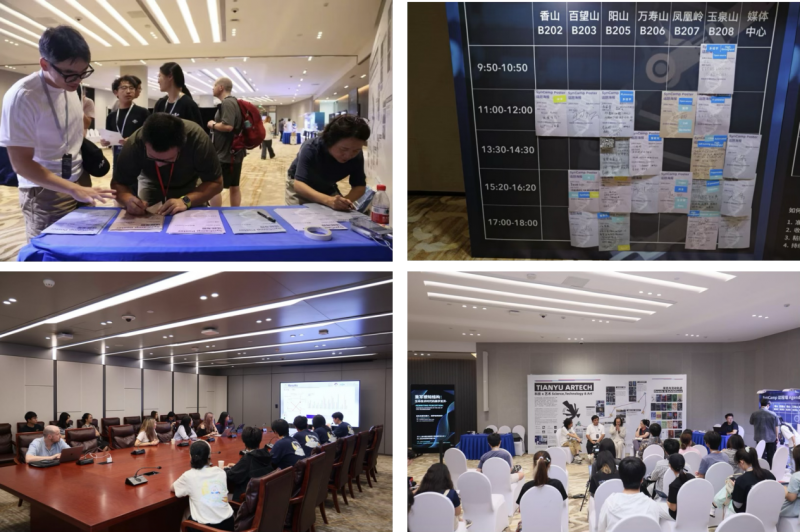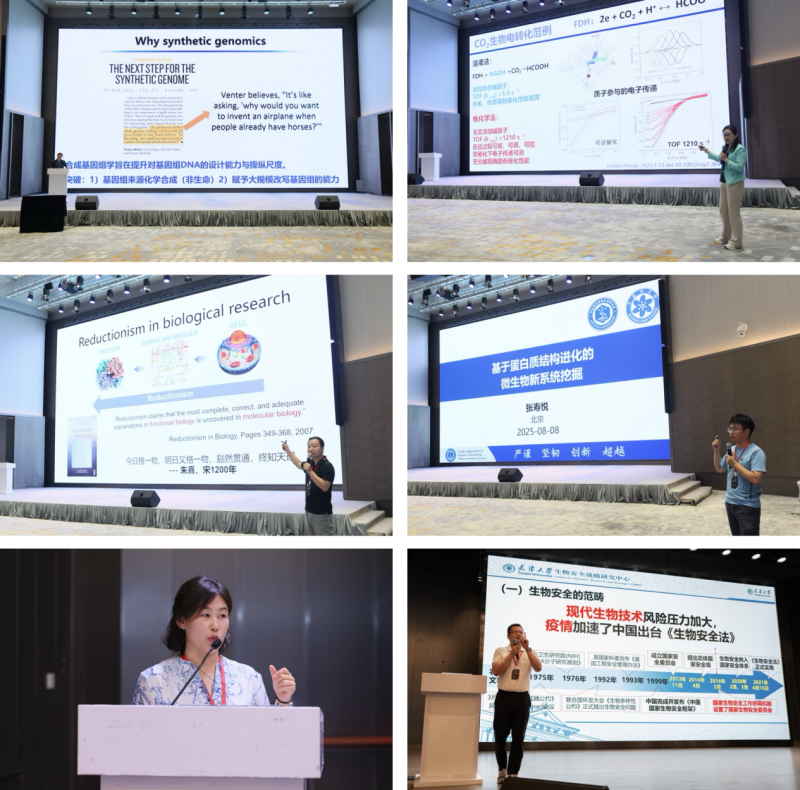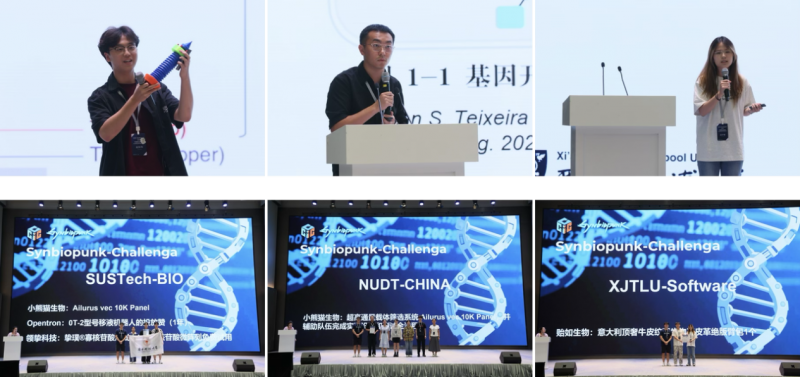|
LONDON and BEIJING – September 1, 2025 – Ailurus Bio, a leading cellular programming company, is spearheading its global movement to transform biology into a fully programmable engineering discipline. The company's vision was on full display at the 2nd Synbiopunk Bio-Developer Unconference, held in conjunction with the 12th China iGEMer Community Conference (CCiC), which concluded on August 8. The three-day event gathered over 1,000 international researchers, industry leaders, and developers in Beijing under the theme "Platform 21¼ of Biology"—symbolizing the convergence of biology with multiple disciplines.
Initiated by Ailurus Bio, the Synbiopunk Unconference serves as a powerful platform for its mission: to democratize biological engineering and empower a new generation of "bio-developers". The unconference brings together people from a wide range of fields—including synthetic biology, artificial intelligence, robotics, security, investment, and regulations. "Our goal is to build the tools and the community that will allow anyone, anywhere, to program biology as simply as they write code," said Dr. Haotian Guo, Founder of Ailurus Bio. "Synbiopunk is where that global community comes to life."

In his opening keynote, titled "Programming Reality by Programming Biology," Dr. Guo outlined a future driven by programmable biology and unveiled the company's latest tools designed to make it accessible worldwide. These include Ailurus vec, an ultra-high-throughput platform that accelerates the screening of genetic vectors, and the groundbreaking PandaPure® system, which uses synthetic organelles to simplify purification processes by up to 90%, lowering a significant barrier for researchers and startups globally.
"Recent advancements in AI have made designing proteins increasingly straightforward. However, obtaining and testing actual proteins in the laboratory remains a challenging endeavor," said Dr. Guo. "Programmed biological systems offer powerful enabling tools that can address this bottleneck and accelerate our research by orders of magnitude."

To foster an international ecosystem, Synbiopunk first introduced the "unconference" format to the biotech field in 2021, and it remains a key feature of the event. This open format, borrowed from the tech industry, encourages spontaneous, attendee-driven collaboration, leading to discussions on topics ranging from the highly technical, such as mirror life and virtual cells, to direct-to-consumer applications in cosmetic products and the intersection of biology and art. This open format, infused with a "punk spirit," offered a unique collaborative environment where a researcher from a top university could brainstorm with a developer from an AI startup.

The convergence of AI, automation, and synthetic biology was a central theme. Panels and showcases featured tech giants like NVIDIA, ByteDance, and Amazon Web Services; pioneers in life science tools like Danaher Life Sciences, Opentrons, Twist Bioscience, and Tsingke Biotech; innovative startups such as LinkZill, Atantares, and Pallas AI; and leaders in downstream applications, like Huaheng Biotech in biomanufacturing and Alamar Biosciences in proteomics. Over three days, attendees engaged in intensive discussions about how to embrace these technological advancements and win in the new era of bioeconomy.

"It's about a differentiation strategy," emphasized Patrick Wei, General Manager of Greater China at Alamar Biosciences, during a panel on "the next leap in DNA synthesis." Patrick shared his experience leading teams at Akoya, Olink, and Alamar to position their products for different applications, even when based on the same core technology of DNA-barcoded antibodies. Representatives from DNA synthesis providers highlighted their different business and technological choices. Mark Dupal, Vice President of APAC at Twist Bioscience, showed how deeply-optimized quality control enables ultra-long oligonucleotide synthesis. Chunde Zhao, Vice President of Tsingke, elaborated on their decision to optimize downstream DNA assembly, empowering a "72-hour delivery" to the customer. Kang Kang, a partner at LinkZill, discussed another layer of innovation: the equipment for oligo synthesis, especially using advanced semiconductor platforms.
Regarding the role of data, Yiming Dong, CSO of Atantares, and Jingchu Wei, Chief AI Scientist at Huaheng Biotech, agreed that "high-quality biological and experimental data is still the 'rare earth' for the industry," sharing their explorations in applying AI to protein engineering and fermentation optimization. Vince Dou, General Manager of Opentrons China, and Kang Fang, an HCLS Industry Solution Architect from AWS, discussed the importance of lab automation and cloud computing in this new wave of the AI-Bio revolution.

A fireside chat between Dr. Guo and Prof. Ariel B. Lindner, a pioneer of synthetic biology in Europe, co-founder of the Paris Biofoundry, and board member of the iGEM Foundation, traced the evolution of the field from a niche academic discipline to a disruptive technological force. "It's about a predictable way of changing a biological system to do a specific function that you predict ahead of time," Prof. Lindner explained. "This is engineering biology, or synthetic biology."

The event also drew leading academics from across China, including Prof. Yi Wu and Prof. Yang Xue from Tianjin University; Prof. Liyun Zhang from Nankai University; Prof. Shuyi Zhang and Dr. Yuhan Bao from Tsinghua University; Dr. Shouyue Zhang from the Institute of Microbiology, CAS; and Dr. Lu Gao from the Institute for the History of Natural Sciences, CAS. Their presentations covered cutting-edge advancements from genomic-level DNA design and pangenome mining to intelligent biological systems and the latest studies around biological safety, security, and responsibility.

At the heart of the conference was the Synbiopunk Challenge, which drew over 110 international student teams competing to solve global problems. Projects addressed challenges in medicine, climate change, sustainable fashion, and agriculture, demonstrating the vast potential of engineered biology. The top prize was awarded to SUSTech-BIO from Southern University of Science and Technology, with NUDT-CHINA and XJTLU-Software taking second and third place, respectively.

As the lines blur between the digital and the biological, events like Synbiopunk are becoming the crucibles for the next technological revolution—one where the source code is written in DNA.
About Ailurus Bio
Ailurus Bio is a pioneering company building bioprograms, which are genetic codes that act as living software to instruct biology. We develop foundational DNAs and libraries to turn lab-grown cells into living instruments that streamline complex procedures in biological research and production. We offer these bioprograms to scientists and developers worldwide, empowering a diverse spectrum of scientific discovery and applications. Our mission is to make biology a general-purpose technology, as easy to use and accessible as modern computers, by constructing a biocomputer architecture for all.
About Synbiopunk
Initiated by Ailurus Bio, Synbiopunk is a global developer community, dedicated to synthetic and engineering biology. It champions the "unconference" model to maximize the depth and density of communication between academic researchers, industry users, tech platforms, investors, and even public regulatory sectors. By fostering direct dialogue and community-driven innovation, Synbiopunk aims to build a robust and collaborative ecosystem for engineering biology.
Media Contact: media@ailurus.bio
|


 Home > News >
Home > News >